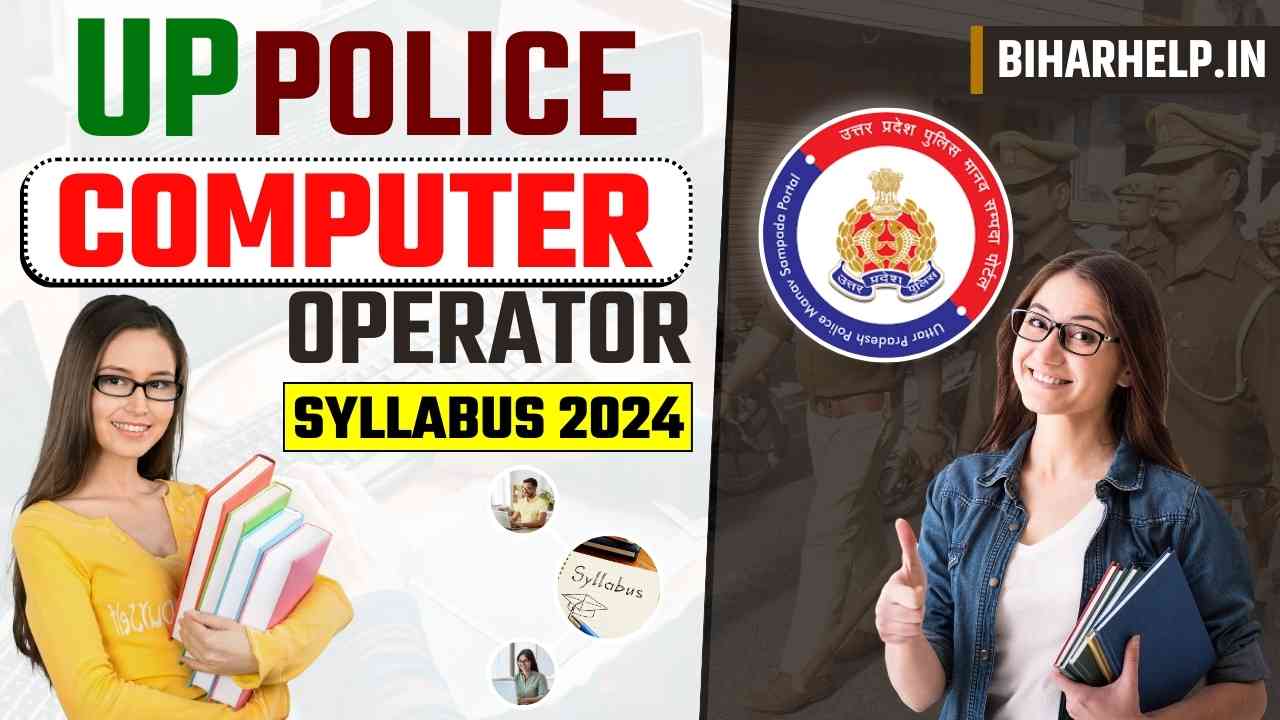UP Police Computer Operator Syllabus 2024: वे सभी उम्मीदवार व युवा जो कि, उत्तर प्रदेश पुलिस मे कम्प्यूटर ऑपरेटर व प्रोग्रामर के पद पर भर्ती हेतु भर्ती परीक्षा की तैयारी कर रहे है उन्हें हम, इस लेख की मदद से विस्तार से UP Police Computer Operator Syllabus 2024 के बारे मे बतायेगे जिसके लिए आपको ध्यानपूर्वक इस लेख को पढ़ना होगा।

इसके साथ ही साथ हम, आपको बता देना चाहते है कि, UP Police Computer Operator Syllabus 2024 के विषयवार सेलेबस के साथ ही साथ हम, आपको कम्प्यूटर ऑपेटर सहित प्रोग्राम के पूरे एग्जाम पैर्टन और डिटेल्ड सेलेबस के बारे मे बतायेगे ताकि आप बना किसी समस्या के भर्ती परीक्षा की तैयारी कर सकें तथा
लेख के अन्तिम चऱण मे हम, आपको क्विक लिंक्स प्रदान करेगें ताकि आप सुविधापूर्वक इसी प्रकार के आर्टिकल्स को प्राप्त कर सकें और इनका लाभ प्राप्त कर सकें।

Read Also 0 – CUET PG Syllabus 2024 PDF Download – Subject-Wise Syllabus and Exam Pattern
UP Police Computer Operator Syllabus 2024 – Overview
| Name of the Article | UP Police Computer Operator Syllabus 2024 |
| Type of Article | Syllabus |
| Name of the Post | Computer Operator and Programmer |
| Detailed Information of UP Police Computer Operator Syllabus 2024 | Please Read The Article Completely. |
UP Police मे कम्प्यूटर ऑपरेटर सहित प्रोग्रामर के पद पर पाये सीधी भर्ती, जाने क्या है पूरा सिलेबस और एग्जाम पैर्टन – UP Police Computer Operator Syllabus 2024?
हमारे वे सभी युवा जो कि, उत्तर प्रदेश पुलिस की नई कम्प्यूटर ऑपरेटर औऱ प्रोग्रामर भर्ती मे आवेदन करने वाले है औऱ भर्ती परीक्षा की तैयारी कर रहे है उन्हें हम, कुछ बिंदुओं की मदद से पूरे UP Police Computer Operator Syllabus 2024 के बारे मे बतायेगे जिसके महत्वपूर्ण बिंदु इस प्रकार से हैं –
Read Also –
- UP Police Computer Operator Recruitment 2024 Notification For 985 Post Online Apply – 12वीं पास यूपी पुलिस कम्प्यूटर ऑपरेटर भर्ती जारी
- Bihar Karyalay Parichari Recruitment 2024: 10वीं पास युवाओं के लिए बिहार में निकाली कार्यालय परीचारी की नई भर्ती, ऐसे करें आवेदन
- Pariksha Pe Charcha 2024 Certificate Download – Registration, Login, Last Date & Step By Step Online Process
- Bihar Vidhan Sabha Sachivalaya Syllabus 2024 And Exam Pattern For Security Guard, DEO, Driver & Office Attendant
UP Police Computer Operator Syllabus 2024 – कम्प्यूटर ऑपरेटर ग्रेड ए का एग्जाम पैर्टन के मुख्य बिंदु क्या है?
| परीक्षा का प्रकार | लिखित परीक्षा |
| पूछे जाने वाले प्रश्नों की प्रकृ़ति | वस्तुनिष्ठ प्रश्न / MCQ |
| परीक्षा की कुल अवधि | 2 घंटे |
| कुल प्रश्नों की संख्या | 160 |
| कुल अंक | 200 |
| प्रत्येक प्रश्न का अंक | 1.25 अंक |
| किन विषयो से प्रश्न पूछा जायेगा |
|
UP Police Computer Operator Exam Pattern 2024
| Name of the Subject | Exam Pattern |
| General Knowledge | No of Questions
No of Marks
|
| Mental Ability and Reasoning | No of Questions
No of Marks
|
| Computer Knowledge | No of Questions
No of Marks
|
| Total | No of Questions
No of Marks
Duration
|
UP Police Computer Operator Syllabus 2024 – कम्प्यूटर ऑपरेटर ग्रेड ए विषयवार सेलेबस क्या है?
| विषय का नाम | महत्वपूर्ण बिंदु |
| सामान्य ज्ञान |
|
| मानसिक अभिरुचि |
|
| तर्क शक्ति |
|
| कप्यूटर ज्ञान |
|
UP Police Computer Programmer Grade 2 Syllabus 2024 – प्रोग्रामर ग्रेड 2 का एग्जाम पैर्टन के मुख्य बिंदु क्या है?
| परीक्षा का प्रकार | लिखित परीक्षा |
| पूछे जाने वाले प्रश्नों की प्रकृ़ति | वस्तुनिष्ठ प्रश्न / MCQ |
| परीक्षा की कुल अवधि | 2 घंटे |
| कुल प्रश्नों की संख्या | 160 |
| कुल अंक | 200 |
| प्रत्येक प्रश्न का अंक | 1.25 अंक |
| किन विषयो से प्रश्न पूछा जायेगा |
|
UP Police Programmer Grade 2 Exam Pattern 2024
| Name of the Subject | Exam Pattern |
| Mental Ability + Reasoning | No of Questions
No of Marks
|
| Information Technology | No of Questions
No of Marks
|
| Computer Programming | No of Questions
No of Marks
|
| Total | No of Questions
No of Marks
Duration
|
UP Police Programmer Grade 2 Syllabus 2024 – प्रोग्रामर ग्रेड 2 विषयवार सेलेबस क्या है?
| विषय का नाम | महत्वपूर्ण बिंदु |
| मानसिक सामर्थ्य / Mental Ability |
|
| Reasoning |
|
| Information Technology |
Logic functions, Minimization, Design and synthesis of combinational and sequential circuits; Number representation and computer arithmetic (fixed and floating point)
Machine instructions and addressing modes, ALU and data-path, CPU control design, Memory interface, I/O interface (Interrupt and DMA mode), Instruction pipelining, Cache and main memory, Secondary storage.
Programming in C; Functions, Recursion, Parameter passing, Scope, Binding; Abstract data types, Arrays, Stacks, Queues, Linked Lists, Trees, Binary search trees, Binary heaps.
Analysis, Asymptotic notation, Notions of space and time complexity, Worst and average case analysis; Design: Greedy approach, Dynamic programming, Divide-and-conquer; Tree and graph traversals, Connected components, Spanning trees, Shortest paths; Hashing, Sorting, Searching. Asymptotic analysis (best, worst, average cases) of time and space, upper and lower bounds, Basic concepts of complexity classes P, NP, NP-hard, NP-complete.
Lexical analysis, Parsing, Syntax directed translation, Runtime environments, Intermediate and target code generation, and Basics of code optimization.
OS: Windows/ Unix Commands & Tools, Processes, Threads, Inter-process communication, Concurrency, Synchronization, Deadlock, CPU scheduling, Memory management, and virtual memory, File systems, I/O systems, Protection, and security.
Word Processing Tools, Electronic spreadsheets, Electronic presentation tools.Microsoft Office (Word, Excel, PowerPoint, Access), Open Office, Using these tools in English and official Indian languages (Windows, Unix, and Unicode Fonts), and Exchange of Files across these platforms.
ER-model, Relational model (relational algebra, tuple calculus), Database design (integrity constraints, normal forms), Query languages (SQL), File structures (sequential files, indexing, B and B+ trees), Transactions and concurrency control.
Information gathering, requirement, and feasibility analysis, data flow diagrams, process specifications, input/output design, process life cycle, planning and managing the project, design, coding, testing, implementation, and maintenance.
ISO/OSI stack, LAN technologies (Ethernet, Token ring), Flow and error control techniques, Routing algorithms, Congestion control, TCP/UDP and sockets, IP (v4), Application layer protocols (icmp, dns, smtp, pop, ftp, http); Basic concepts of Hubs, Switches, gateways and routers, Network security basic concepts of public key and private key cryptography, digital signature, firewalls.
HTML, XML, basic concepts of client-server computing. |
| Computer Programming |
History of Computing, Future of Computing, Trends in Programming Language.
(i) C Language Introduction to ‘C’ Language, Conditional Statements and Loops, Arrays, Functions, Storage Classes, Structures and Unions, Pointers, Self Referential Structures and Linked Lists, Recursion, Parameter Passing, Scope, Binding, Abstract Data Types, Stacks, Queues, Trees, Binary Search Trees, Binary Heaps, Programming & Problem Solving Through ‘C’ Language. (ii) C++ with Object Oriented Programming Overview of Object Modeling, Object and Dynamic Modeling, Functional Modeling, System and Object Design, Comparision of Existing Methodology, Programming Style in object Oriented Language, Non-Object Oriented, Relational Date Base Object, Object Diagram Compiler, distributed Design System. An overview of C, Origin of C++, Classes and Objects, arrays, Pointers and references, Functions and Operator Overloading, Inheritance, Virtual Function and Polymorphism, C++ I/O, System Basics, C++ files I/O, Array-based I/O, Templates and Generic Programming, Exception Handling, Templates. (iii) Java Java Applets, Graphics, Graphical User Interfaces, Exception Handling, Threads; Java basics, Java coding conventions, Java API, Garbage collection, I/O Streams, Java database connectivity.
MPI, OpenMP, Threads.
JavaScript functions.
Foundations for Internet programming-An overview of Internet Programming-TCP/IP Protocol Model, LAN Topologies, Internet working IP Address & Domain Names, Client Server Model, WWW Design Issue, Security and Encryption, Developing Internet Application, Java and Internet, Java Development Environments, Introduction to Java Programming, Visual C++, Tools for Internet and Desktop, Extending Java using Active X, CGI & Internet Application, Perl and Internet, Perl in Internet Application, Microsoft Implementation using win 32 Internet (WinLnet), Jawa script, VB Script, VB Script Language, Internet Markup Language (HTMP, SGML) Netscape Extension, Microsoft Internet only HTML, Text Shockwave and Lingo, creating an active X control to Active Web Page, Creating Netscape Navigator, Pulling Web Information, Creating a custom Integrated Application and Real Audio. |
अन्त, इस प्रकार हमने आपको विस्तार से पूरे सेलेबस के बारे मे बताया ताकि आप सुविधापूर्वक भर्ती परीक्षा की तैयारी कर सके औऱ सफलता प्राप्त कर सकें।
सारांश
आप सभी परीक्षार्थियो को समर्पित इस लेख में हमने आपको विस्तार से ना केवल UP Police Computer Operator Syllabus 2024 के बारे मे बताया बल्कि हमने आपको विस्तार से पूरी- पूरी विस्तृत जानकारी प्रदान की ताकि आप आसानी से भर्ती परीक्षा की तैयारी करके अपार सफलता प्राप्त कर सके तथा
लेख के अन्तिम चऱण मे हम, आपसे उम्मीद करते है कि, आपको हमारा यह आर्टिकल बेहद पसंद आया होगा जिसके लिए आप हमारे इस आर्टिकल को लाईक, शेयर व कमेंट करेगे।
क्विक लिंक्स
| Join Our Telegram Group | Click Here |
FAQ’s – UP Police Computer Operator Syllabus 2024
Who is eligible for computer operator in UP Police?
Candidates must have pursued intermediate in any stream from a recognised board. Must have pursued O level DOEACC recognised by Government of India or its equivalent. Must be within 18-28 Years.
How many questions are there in UP Police Assistant Operator exam?
The written exam would comprise 400 multiple choice questions with four options. The total marks for the UP Police Operator exam shall be 400 marks. Each question will be worth one mark, and if you answer incorrectly, you will lose 0.25 marks.
